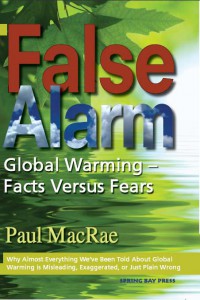Published by paulmacrae on 10 Aug 2013 at 12:36 pm
University of Victoria promotes climate alarmism
“Runaway greenhouse easier than previously thought,” shouts a headline on the University of Victoria home page in August. A sidebar headline asks: “Is Earth the next Venus?” With pictures of belching smokestacks, the clear implication is that human carbon emissions are going to create this runaway greenhouse.
The home page text reads: “UVic researcher Colin Goldblatt (School of Earth and Ocean Sciences) has found that the amount of solar energy the Earth now receives could trigger the greenhouse effect, where the planet would be sterilized and left with an atmosphere like that of Venus.” Scary!
Under a “Read More” link is short summary of Dr. Goldblatt’s research paper, published in Nature Geoscience. While the headline this time is more restrained—“Runaway greenhouse effect possible but difficult”—the first paragraph rather breathlessly announces that a runaway greenhouse effect would be “easier” to trigger than was previously believed. Yikes!
The last paragraph in the summary notes, however, that while a “sterilized” Earth could occur, it would take “10 times more carbon dioxide in the atmosphere to trigger this than burning all of Earth’s fossil fuels—every bit of coal, oil and gas that exists—would give.”
In other words, if Dr. Goldblatt’s figures are correct, the possibility of a runaway greenhouse is extremely unlikely, the chances of a runaway greenhouse due to human carbon emissions are non-existent, and the UVic website’s main headline is seriously misleading and unnecessarily alarmist.
Elsewhere in UVic’s E&OS department, climate modeler Dr. Andrew Weaver has claimed that, even if we stabilize CO2 levels at 2006 levels, global warming could continue “unbounded” for centuries—i.e., a runaway greenhouse (Keeping Our Cool: Canada in a Warming World, p. 84).
One view or the other is wrong—no “consensus” here, apparently!—and my bets go with Dr. Goldblatt. Meanwhile, it’s sad to see the University of Victoria promoting global-warming scare stories that have no foundation in fact simply because these scares bring in research funding.


